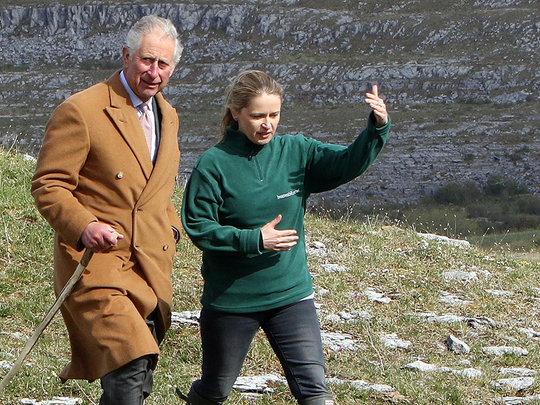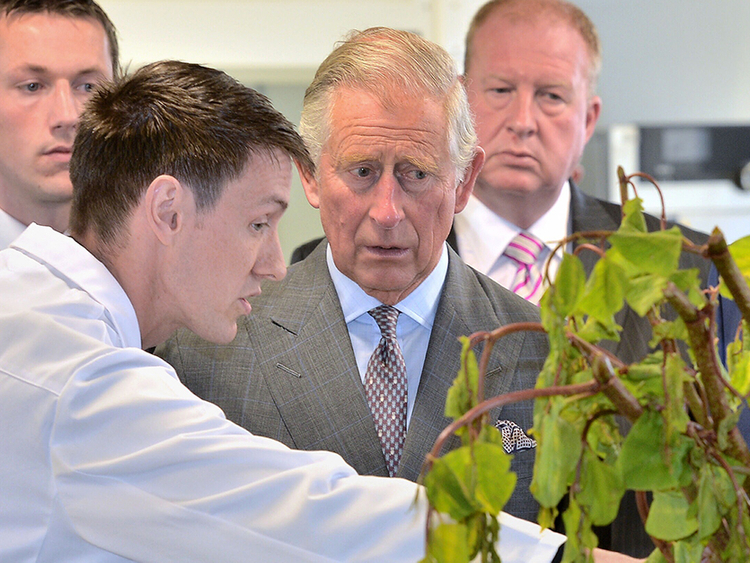
SLIGO, Ireland: Britain’s Prince Charles on Wednesday spoke of his “anguish” at the murder of his beloved great-uncle by the IRA paramilitary group in 1979, on an emotional visit to the assassination site in Ireland.
The heir to the throne is on a two-day trip to the country, where on Tuesday he became the first British royal to meet Gerry Adams, the veteran leader of Sinn Fein, the political arm of the now defunct Irish Republican Army.
Charles and his wife Camilla are currently in the western county of Sligo, where they will later pay what is expected to be an emotional visit to the village of Mullaghmore where Lord Mountbatten was murdered.
Louis Mountbatten, Charles’ godfather and great-uncle, his mother Queen Elizabeth II’s cousin and the last viceroy of British-ruled India, was killed aged 79 when the IRA blew up a bomb on his fishing boat.
Two relatives, one of them Charles’ teenage godson, and a 15-year-old local boy also died in the attack.
“At the time I could not imagine how we would come to terms with the anguish of such a deep loss,” Charles told an audience in Sligo ahead of the Mullaghmore visit.
“Through this dreadful experience I now understand in a profound way the agonies borne by others on these islands of whatever faith or political persuasion.”
A few hours after the attack, 18 British soldiers were killed in an IRA ambush across the border in Northern Ireland, in one of the deadliest days of The Troubles.
An estimated 3,500 people died during the sectarian unrest, which lasted three decades.
In a sign of the warming relations between Ireland and Britain, Charles and his wife were met with crowds of cheering onlookers in Sligo, although security was tight.
The Prince of Wales recalled remarks made by his mother in 2011 when she became the first British monarch to visit Ireland since it gained independence from Britain in 1922.
“We all have regrets. As my mother said at Dublin Castle, with the benefit of historical hindsight we can all see things which we would wish had been done differently or not at all,” Charles said.
“I’m only too deeply aware of the long history of suffering which Ireland has endured not just in recent decades but over the course of its history.
“The recent years have shown us that healing is possible.”
In Mullaghmore, Union Jack bunting flew alongside the Irish tricolour flag in honour of the royal visit.
Mountbatten’s grandson, Timothy Knatchbull, who survived the blast but whose 14-year-old twin brother Nicholas was killed, was reportedly due to attend alongside some of those who helped after the attack.
The visit comes the day after a historic meeting between Charles and Adams, who refuses to recognise the authority of the British monarchy in Northern Ireland.
The two men, both aged 66, shook hands at a crowded event at a university in Galway in western Ireland before retiring for a private meeting.
Adams, who has denied he was a key figure in the IRA, said the meeting had been a “big thing for us to do”.
“We did discuss the need for the entire process to move forward ... and the need to heal,” Adams said.
He added: “I think it’s fair to say that Charles is also looking to the future and wants to be a positive influence. Both he and we expressed regret for what happened from 1968 onwards.”
Adams and other senior Sinn Fein members boycotted the queen’s groundbreaking visit to Ireland in 2011.
Ahead of the Mullaghmore visit, Charles and Camilla were due to pay their respects at the grave of famed Irish poet W.B. Yeats, who died in 1939.
In Sligo, Charles recalled one of Yeats’ verses, where he wrote that “peace comes dropping slow”.
“As a grandfather myself I pray that his words can apply to all those who have been so hurt and scarred by the troubles of the past so that all of us, all of us who inhabit these Atlantic islands, may leave our grandchildren a lasting legacy of peace, forgiveness and friendship,” he said.












